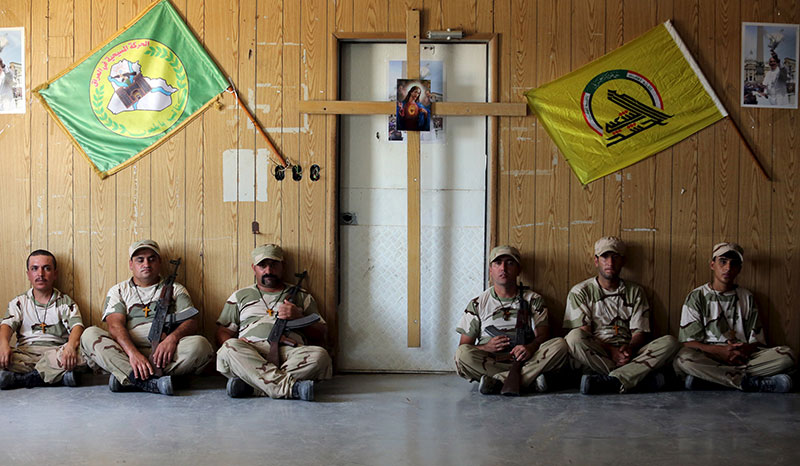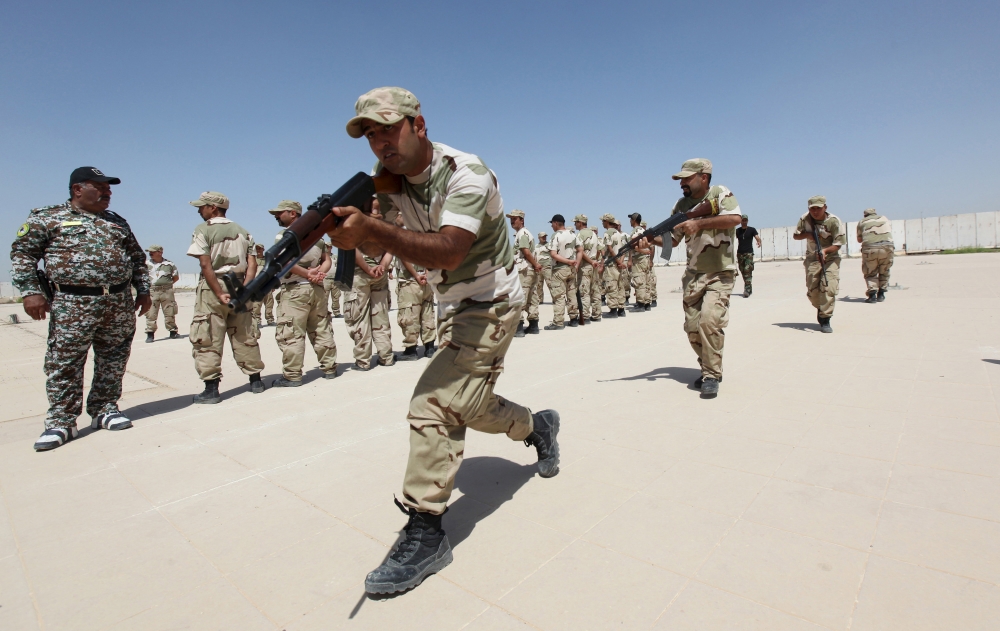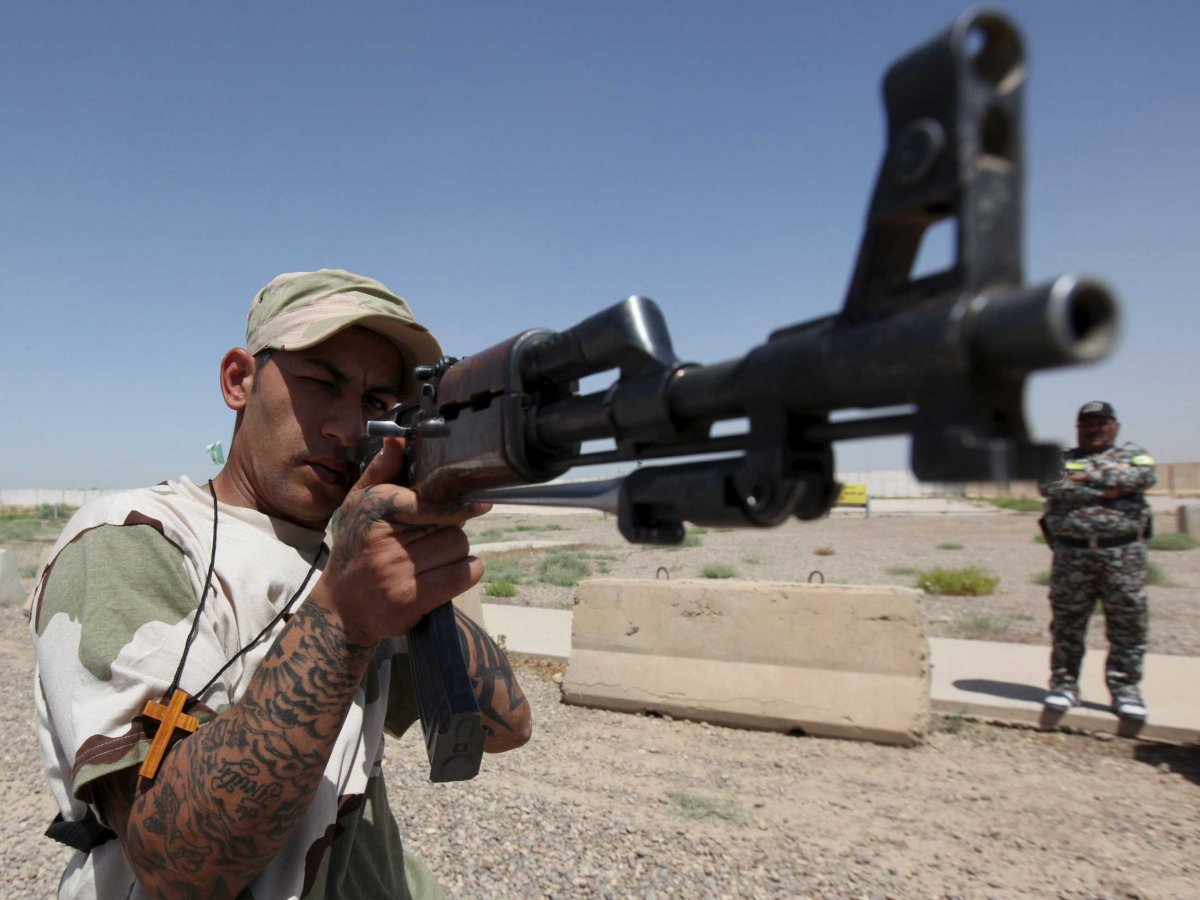A group of Christians in Iraq have formed their own militia to protect people from the so-called Islamic State group. The leader of the Babylon Brigade says they were left with no choice but to take up arms when IS fighters targeted Christians.
There’s a striking picture on the wall. It shows an untarmacked road, scorched by sunlight, leading to a small village with a mountain range behind it. And all along the side of the road there are crosses every 100m – taller even than lamp posts.
“Christian village,” a guard mumbles. “Near Mosul.”
We are in the Baghdad headquarters of the Iraq Christian Resistance, Babylon Brigade. They are a militia, although they prefer the phrase popular mobilisation unit. Whatever the language, about 30 of these outfits have sprung up in the past couple of years and between them they have 100,000 armed volunteers. They were formed to block the advance of the so-called Islamic State group when it swept through north and west Iraq in 2014, even threatening Baghdad. When the Iraqi national army collapsed the militias stood firm.

Most are Shia Muslim. A handful are Sunni Muslim, one is Christian – the Babylon Brigade.
The other pictures on the wall are photographs, all depicting the Babylon Brigade’s leader and the man I have come to meet, Rayan al-Kildani. Kildani in military fatigues, Kildani with shades, Kildani meeting some important people, Kildani looking contemplative, Kildani looking determined.
And then the man himself arrives with a small entourage, most of them in suits but one young man with a wispy beard is in military clothing.

I’m not sure how seriously to take Kildani. The militias have persuaded the central government to cover their expenses and as a result they are, taken altogether, receiving about $1.4bn (£1bn) a year. For a militia leader like Kildani it’s more than $600 (£450) per man per month. Good money. There are stories about people renting a house in Baghdad, gathering a few people together, announcing they have formed a militia and going to the government to apply for the funds.
“How many men have you got?” I ask.
“That’s a military secret,” he says.
Really? I saw another man from the militias the day before and he was quite open about numbers. I’d been a little surprised when that militiaman apologised for his English saying it should have been better given that he was from Wembley in North London.
“Really, Wembley? By the football ground?” I had said.
“Yes, my wife and children are still there.”
Anyway he’d seemed happy to talk numbers. So I press Kildani again.
“Hundreds of men or thousands?”
“Many.”
“Weapons?”
“Rockets,” he says. “Medium ones. This is war. You can’t fight a war with rifles.”
“So, a Christian militia,” I remark.
“What Islamic State was doing to the Christians is terrible,” he says. “They are the devil.”
“Your militia has fought?”
“We fight side by side with the Muslim militias,” he says, claiming: “We are the first Christian power in Iraqi history.”
And then: “I know the Bible says that if you get hit on one cheek you should offer the other. But we have really good defence forces now. No-one is going to do anything bad to the Christians. Some Christians had their homes taken over. I have personally been to those houses to tell the new people living there to get out. Christian suffering is over.”
One of his four phones rings. He glances at the incoming number, grunts and gives it to someone to answer.
“What about the commandment: Thou shalt not kill?” I ask.
“You are a Christian?” Kildani asks, somewhat doubtfully.
“Church of England,” I offer.
Kildani nods as if that explains it.
“He’s a Protestant,” someone says with a note of disapproval. “Sectarianism runs deep in Iraq,” I think. But of course I don’t say that.
Kildani turns to me again: “We have to fight. We have to defend ourselves.”
And then, to my surprise, he adds: “Jesus himself told us that if you don’t have a sword you should go out and buy one.”
I cast my mind back to my schooldays of Bible study but can’t remember Jesus telling people to arm themselves.
“Did he really say that?”
“It’s in the Bible,” Kildani insists.
“Matthew,” one man says. “Luke,” says another. “Matthew and Luke,” they both say. I looked doubtful.
Kildani glances over to one of his assistants who is playing a game on his phone.
“Find it!” he orders.
The young man with the phone walks over to me. He has the verse on his screen in Arabic.
It is Luke chapter 22, verse 36: “If you have a purse, take it, and also a bag; and if you don’t have a sword, sell your cloak and buy one.”
Turns out theologians have been arguing about the verse for centuries. Is that a real sword? Or a metaphorical one? Kildani is in no doubt. He says he and his men are out on patrol. And they’re armed.
Culled from the BBC Magazine







